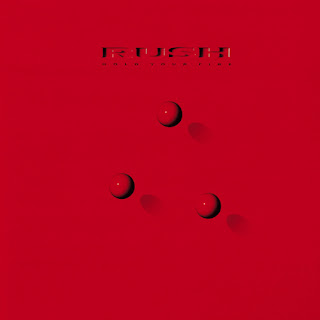After finishing the tour for Power Windows, Rush would go back into the studio with co-producer Peter Collins to create what would be the last of the band's synth-heavy albums. The result would be the most pop-friendly and radio-accessible of the band's albums, but despite (or perhaps because) of this, Hold Your Fire would wind up being something of a commercial disappointment.
The album starts off strong (as Rush albums tend to do) with 'Force Ten', a driving, percussive song that was the tenth (and last) song recorded for the album, hence the song title. Musically, this is one of the best songs on the album, and the lyrics (co-written by Pye Dubois, who also collaborated with Peart on 'Tom Sawyer') hold together nicely as well. Following next is 'Time Stand Still', which features backing vocals by Aimee Mann of 'Til Tuesday (and why Mann didn't achieve greater success in her solo career is one of the great mysteries/injustices of the music industry), an effective piece that manages to be both reflective and engaging at the same time.
'Open Secrets' isn't as strong as the first two tracks, and has little to distinguish it either musically or lyrically. 'Second Nature' is better musically but not as good lyrically; there's a nice opening sequence with the keyboards that sounds closer to a classical piano that the normal synthesizers on display throughout the album (which in some ways would hint at the bands approach to come regarding keyboards on Presto), but the lyrics, dealing with the need for big business and other powerful entities to take responsibility for how their actions affect others – a far cry from the Rand-inspired 'Anthem' – unfortunately suffers from some rather clumsy and forced turns of phrasing.
'Prime Mover' picks things back up nicely, with a nicely up-tempo tune with some excellent musicianship that might be easy to overlook at first, but can sneak up and grab you after repeated listenings. 'Lock and Key' sounds a bit like it may have been conceived as an extension of Peart's “Fear” series, but it lacks the punch of those songs, and comes off as something of a retread. 'The Mission' deals with the costs and demands of creativity, and while it is quite nice musically, lyrically it may not appeal to everyone (because, let's face it, whether it's justified or not, few people want to hear an artist tell you how difficult it is to be an artist). 'Turn The Page' (no relation to the Bob Segar song of the same name) is another fast-paced rocker, one that has some nice time-changes that help to carry it and give it some extra oomph.
The last two songs of the album, 'Tai Shan' (inspired by Peart's visit to China) and 'High Water', end the album on a weaker note than one might hope for. Both songs have a mystical quality to their lyrics; unfortunately, Neil's lyrics are sometimes at his weakest when he tries to get touchy-feely with his subject matter. Of the two songs, the former at least has some nicely evocative music; the latter doesn't even have that going for it (although it does have one of one of Lifeson's more noteworthy solos).
This is probably the most musically uneven Rush album since Caress of Steel, and the weakest of the band's four synth-based albums that they made in the 80's. There are some really good songs here, but about half of the album fails to really stand out, dragging down the better songs with them somewhat. The synthesizers continue to dominate musically, although Geddy does also give us some awesome bass riffs throughout the album. Neil's drumming is solid and inventive as usual, with some nice flourishes here and there. The guitar work by Alex is well done, but except for a few really nice solos, most of it is relegated to rhythm work backing either Geddy's keyboards or bass leads. The production work isn't bad, comparable to that of Power Windows (as an aside, this is the first Rush album to take advantage of the CD format, clocking in at about 50 minutes – most previous Rush studio albums were about 40 minutes long, give or take).
Commercially, Hold Your Fire was something of a disappointment for the band. It was their first album since Hemispheres not to reach the Top 10 of Billboard's album charts, and only went Gold in terms of overall sales, unlike the majority of Rush albums which eventually go Platinum. As a result, it's a somewhat disappointing coda to the band's experiments with a more synth-driven sound. After this, the group would once again begin to shift gears musically, evolving their sound yet again.


No comments:
Post a Comment